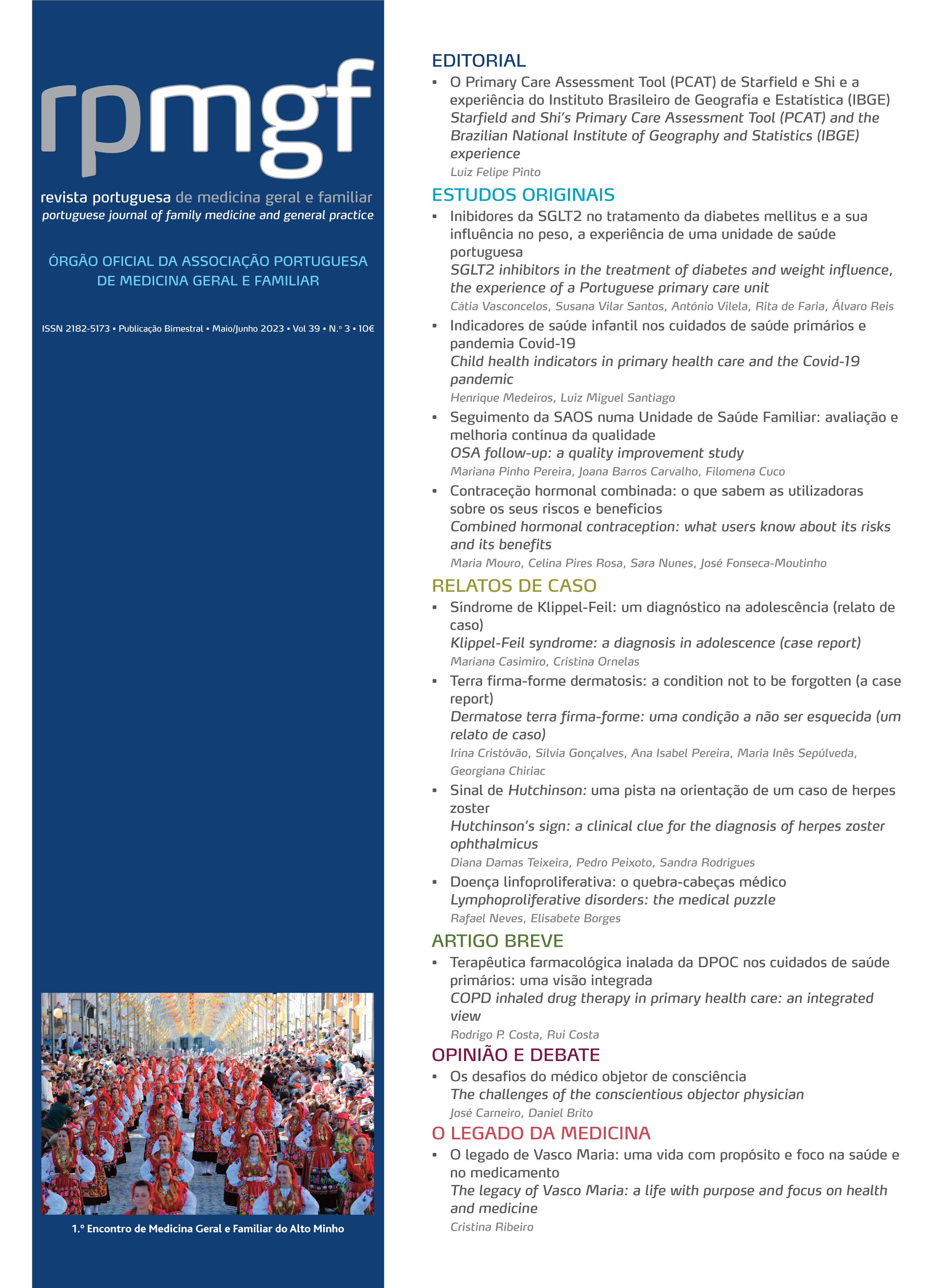COPD inhaled drug therapy in primary health care: an integrated view
DOI:
https://doi.org/10.32385/rpmgf.v39i3.13607Keywords:
COPD, Inhalers, Bronchodilators, Exacerbation, Lung functionAbstract
COPD is a chronic disabling disease with persistent respiratory symptoms and airflow limitation. It is frequently related to comorbidities that must be managed in an integrated way. Inhalation therapy is the therapy of choice for the treatment of COPD patients. When monotherapy is chosen, long-acting anticholinergics should be preferred. Dual bronchodilation is the most appropriate baseline treatment for most patients with COPD. Triple therapy is required for a subpopulation of these patients, and general practitioners/family doctors must be qualified to prescribe it. Teaching and regular assessment of inhalation techniques are key to therapeutic success. The adoption of the acronym EDUCAR (Explain, Demonstrate, Use, Correct, Annotate, Reassess) is proposed to be applied in all appointments of people using inhaled therapy to achieve the greatest benefit for the patient.
Downloads
References
Gold Initiative for Chronic Obstructive Lung Disease. Golden strategy for the diagnosis, management, and prevention of chronic obstructive pulmonary disease (2023 report) [homepage]. GOLD; 2023. Available from: https://goldcopd.org/2023-gold-report-2/
Usmani OS, Capstick T, Saleem A, Scullion J. Choosing an appropriate inhaler device for the treatment of adults with asthma or COPD [Internet]. UK Guidelines; 2020. Available from: https://img.medscapestatic.com/vim/live/professional_assets/20200729inhaleralgorithmv5withreferences_137511.pdf
National Asthma Council Australia. Inhaler technique in people with asthma or COPD [homepage]. Melbourne: National Asthma Council Australia; 2018. Available from: https://www.nationalasthma.org.au/living-with-asthma/resources/health-professionals/information-paper/hp-inhaler-technique-for-people-with-asthma-or-copd
Usmani OS. Choosing the right inhaler for your asthma or COPD patient. Ther Clin Risk Manag. 2019;15:461-72.
Mahler DA. The role of inspiratory flow in selection and use of inhaled therapy for patients with chronic obstructive pulmonary disease. Respir Med. 2020;161:105857.
Costa R, editor. Guia prático de gestão da DPOC nos cuidados de saúde primários. Madrid: Springer Healthcare Ibérica; 2021. ISBN 978-84-09-33955-6
The Management of Chronic Obstructive Pulmonary Disease Work Group. VA/DoD Clinical practice guideline for the management of chronic obstructive pulmonary disease: version 3 [homepage]. U.S. Department of Veterans Affairs, Department of Defense; 2021. Available from: https://www.healthquality.va.gov/guidelines/cd/copd/
Nici L, Mammen MJ, Charbek E, Alexander PE, Au DH, Boyd CM, et al. Pharmacologic management of chronic obstructive pulmonary disease: an official American Thoracic Society clinical practice guideline. Am J Respir Crit Care Med. 2020;201(9):e56-69.
Singh D, Donohue JF, Boucot IH, Barnes NC, Compton C, Martinez FJ. Future concepts in bronchodilation for COPD: dual-versus monotherapy. Eur Respir Rev. 2021;30(160):210023.
Mammen MJ, Pai V, Aaron SD, Nici L, Alhazzani W, Alexander PE. Dual LABA/LAMA therapy versus LABA or LAMA monotherapy for chronic obstructive pulmonary disease: a systematic review and meta-analysis in support of the American thoracic society clinical practice guideline. Ann Am Thorac Soc. 2020;17(9):1133-43.
Bafadhel M, Pavord ID, Russell RE. Eosinophils in COPD: just another biomarker? Lancet Respir Med. 2017;5(9):747-59. Available from: http://dx.doi.org/10.1016/S2213-2600(17)30217-5
Wilkinson TM. Are inhaled corticosteroids increasing the ‘load’ for some patients with COPD? Eur Respir J. 2017;50(4):1701848.
Stolz D, Miravitlles M. The right treatment for the right patient with COPD: lessons from the IMPACT trial. Eur Respir J. 2020;55(5):2000881.
Mammen MJ, Lloyd DR, Kumar S, Ahmed AS, Pai V, Kunadharaju R, et al. Triple therapy versus dual or monotherapy with long-acting bronchodilators for chronic obstructive pulmonary disease: a systematic review and meta-analysis. Ann Am Thorac Soc. 2020;17(10):1308-18.
Chalmers JD, Laska IF, Franssen FM, Janssens W, Pavord I, Rigau D, et al. Withdrawal of inhaled corticosteroids in COPD: a European Respiratory Society guideline. Eur Respir J. 2020;55(6):2000351.
Micheletto C, Braido F, Contoli M, Di Marco F, Santus P. A framework for step down or therapeutic re-organization for withdrawal of inhaled corticosteroids in selected patients with COPD: a proposal for COPD management. Int J Chron Obstruct Pulmon Dis. 2019;14:2185-93.
Celli BR, Anderson JA, Cowans NJ, Crim C, Hartley BF, Martinez FJ, et al. Pharmacotherapy and lung function decline in patients with chronic obstructive pulmonary disease: a systematic review. Am J Respir Crit Care Med. 2021;203(6):689-98.
Price D, West D, Brusselle G, Gruffydd-Jones K, Jones R, Miravitlles M, et al. Management of COPD in the UK primary-care setting: an analysis of real-life prescribing patterns. Int J Chron Obstruct Pulmon Dis. 2014;9:889-904.
Han MK, Quibrera PM, Carretta EE, Barr RG, Bleecker ER, Bowler RP, et al. Frequency of exacerbations in patients with chronic obstructive pulmonary disease: an analysis of the SPIROMICS cohort. Lancet Respir Med. 2017;5(8):619-26.
MacLeod M, Papi A, Contoli M, Beghé B, Celli BR, Wedzicha JA, et al. Chronic obstructive pulmonary disease exacerbation fundamentals: diagnosis, treatment, prevention and disease impact. Respirology. 2021;26(6):532-51.
Downloads
Published
Issue
Section
License
Copyright (c) 2023 Portuguese Journal of Family Medicine and General Practice

This work is licensed under a Creative Commons Attribution-NonCommercial-NoDerivatives 4.0 International License.
The authors will assign to the RPMGF the sole right to publish and distribute the content of the manuscript specified in this declaration via physical, electronic, broadcasting or any other medium that may come into existence. They also grant the RPMGF the right to use and exploit this manuscript, in particular by assigning, selling or licensing its content. This permission is permanent and takes effect from the moment the manuscript is submitted, has the maximum duration allowed by applicable Portuguese or international law and is of worldwide scope. The authors further declare that this assignment is made free of charge. If the RPMGF informs the authors that it is not going to publish their manuscript, the exclusive assignment of rights ceases forthwith.
The authors authorise the RPMGF (or any entity it may appoint) to act on their behalf when it believes that copyright may have been infringed.





